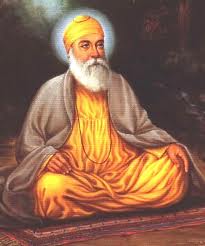From the outside, it sure looks like this is the case: That Sikhi is a synchronization–an amalgam–between Hinduism and Islam. At first, that’s exactly what I thought, that the whole faith was like a rebellious child born from two warring parents. It’s my observation so far this year that no faith arises from a vacuum, however I do not believe that Sikhi is a religion/philosophy cobbled together by Guru Nanak in some reactionary way.

Guru Nanak himself said, “There is no Hindu, no Muslim.” Right from the start, Guru Nanak separates his teachings from the status quo. Before he made this statement, the story goes that he met the Divine after plunging into a river, having disappeared for three days. The experience was so awesome, that Guru Nanak became enlightened. His praise of the moment is enshrined as the mool mantar, the opening lines of the Sikh Scripture:
“There is but One God, His name is Truth, He is the Creator, He fears none, he is without hate, He never dies, He is beyond the cycle of births and death, He is self illuminated, He is realized by the kindness of the True Guru. He was True in the beginning, He was True when the ages commenced and has ever been True, He is also True now.”
So what makes the Sikhi way different from Hinduism and Islam? Because I’ve experienced both of these faiths, I can now say with confidence that my initial reaction to Sikhi as a combination of the two is wrong. Let’s go over a few of the differing points based on each faith.
Hinduism and Sikhi
–Unlike Hinduism, there is no caste system in Sikhi. All of creation is an equal emanation of The One (God)
–In Hinduism, Sanskrit is considered a sacred language compared to all others. In Sikhi, while Gurmukhi is a specialized script, it was instituted for ease of access by common folk to the scripture, and therefore is not viewed as superior to other languages.
–In Hinduism, there is belief in many gods/goddesses and these are occasionally seen as emanations from One. Sikhi has no such concept. There is only One God, present in all reality.
–Sikhi does not support the superiority of the Vedas or Gita (Hindu scriptures).
–Sikhi does not believe in the four stages of life, including the ascetic. Instead, Sikhi insists on the householder’s life. In this way, a normal life is embraced, not cast off as an illusion getting in the way of union with God (unless one attaches themselves to it).
–Sikhi rejects the notion of divine incarnation. As is stated in the mool mantar, “He is beyond the cycles of births and death.” Therefore no avatars or incarnations of the True God exists. God is present within all.
Islam and Sikhi
–Again, there are many Muslims who believe in the superiority of Arabic above other languages. Sikhi does not share this belief.
–While Guru Granth Sahib (living, eternal Guru of the Sikhs and holy Scripture) contains writings from Muslim saints, Sikhs do not regard the Qur’an or any religion’s prophet as superior to others. All religions are equal.
–Sikhi does not advocate conversion or believe one religion/system is better than another.
–The motivation in Sikhi is the love of God and adoration of His presence within creation. In contrast, much of the language of God within the Qur’an is based on harsh warnings and tough love.
–Sikhs and non-Sikhs alike are welcome in all Sikh holy places, whereas non-Muslims are restricted from some masjids and the Kaaba in Mecca.
–Women are permitted and encouraged to lead congregations in prayer, kirtan (singing hymns), and all other manner of religious/social function.
–Sikhs reject ritual actions, such as fasting, pilgrimages, and the ritual slaughter of animals in the name of God.
These are just some of the ways we understand Sikhi as different from Hinduism and Islam, which were the two native faiths at the time of the Gurus. Now, I can already see the comments pouring in. “Andrew’s trying to make our religion (Islam, Hinduism) look bad. He thinks Sikhi is better! (insert whine)”
No, that’s not it, people. Fact is, Sikhs catch a lot of flak from folks insisting they are a “cafeteria-style” faith, taking what they like from each religion and leaving the rest behind. This simply isn’t true. The Sikhs have a unique and dynamic religion full of color, scope, and depth. I believe Guru Nanak and the other Gurus were truly inspired. I also believe that the Hindu rishis (holy men who contemplated on the divine) and Muhammad were also inspired. The Sikh scriptures say,
“Say not that the Vedas and Muslim books are false. False is he, who reflects not on them.” –Bhagat Kabir, Parbhati, pg. 1350
Indeed, there is wisdom we can glean from all faiths. My Islam Mentor once told me that “Conversion is not that important to me. Actually, it’s in my best interest that Christians become better Christians, Muslims become better Muslims, and the same for everybody else.“
Man, I pick out some good Mentors, huh? Just as the Gurus and my Islam Mentor said, we must become better versions of ourselves and reflect more deeply on the wisdom we have. After all, some believe it all came from the same place anyway.

